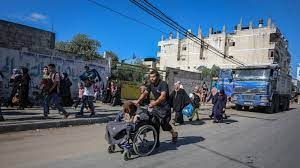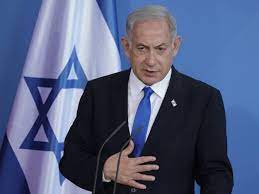Reasons for Egypt’s and other Arab nations’ refusal to accept Palestinian refugees from Gaza
Some wonder why nearby Egypt and Jordan don’t accept the displaced Palestinians while Israel bombards the besieged Gaza Strip nonstop in reprisal for Hamas’ horrific assault on October 7.
The two nations, which share borders with Gaza and the occupied West Bank respectively and surround Israel on opposite sides, have firmly refused. There are already many Palestinians living in Jordan.
On Wednesday, Egyptian President Abdel Fattah el-Sissi said the present conflict was not just intended to combat Hamas, which governs the Gaza Strip, but also “an attempt to push the civilian inhabitants to… migrate to Egypt.” He forewarned that this may ruin the tranquility in the area.
The previous day, King Abdullah II of Jordan issued the following proclamation: “No refugees in Jordan, no refugees in Egypt.”
Their reluctance stems from a worry that Israel aims to compel the permanent deportation of Palestinians into their nations and undermine Palestinian statehood ambitions. El-Sissi said that the 40-year-old peace agreement between Egypt and Israel would be in jeopardy if a large-scale migration brought extremists into the Sinai Peninsula of Egypt.
Here are the reasons for Egypt’s and Jordan’s positions.
A History of Migration
In Palestinian history, displacement has played a significant role. 700,000 Palestinians are said to have been driven out of what is now Israel during the 1948 war that preceded the formation of Israel. The incident is known to Palestinians as the Nakba, which is Arabic for “catastrophe.”
During the 1967 Middle East conflict, 300,000 additional Palestinians fled, mostly into Jordan, when Israel conquered the West Bank and Gaza Strip.
There are now up to 6 million refugees and their descendants, the most of whom reside in camps and settlements in the West Bank, Gaza, Lebanon, Syria, and Jordan. With many refugees establishing themselves in Western nations or Gulf Arab nations, the diaspora has grown further.
In this official photograph from June 22, 1967, Palestinian refugees prepare to cross the Allenby Bridge, which has collapsed, across the Jordan River from the Jordanian territory controlled by Israel.(AP)
In this official photograph from June 22, 1967, Palestinian refugees prepare to cross the Allenby Bridge, which has collapsed, across the Jordan River from the Jordanian territory controlled by Israel.(AP)
Israel forbade refugees from the 1948 war from returning to their homes after hostilities ceased. Israel has since rejected Palestinian requests for the repatriation of refugees as a condition of a peace agreement, claiming that doing so would endanger the country’s Jewish majority.
Egypt worries that the past will repeat itself and a sizable number of Gaza’s Palestinian refugees would remain there permanently.
ABSENCE OF RETURN GUARANTEE
This is in part due to the fact that it is unclear how the conflict will conclude.
Israel said it would annihilate Hamas in retaliation for its heinous attacks on its southern communities. However, it hasn’t indicated what may occur thereafter or who would rule Gaza. This has sparked worries that it may temporarily reoccupy the area, igniting new hostilities.
The Israeli military said that when the battle is over, Palestinians who complied with its order to leave northern Gaza for the southern half of the strip would be permitted to return home.
Egypt is unconvinced.
On October 13, 2023, the Israeli army issues an extraordinary evacuation alert, causing Palestinians in northern Gaza to escape to the south.(AP)
On October 13, 2023, the Israeli army issues an extraordinary evacuation alert, causing Palestinians in northern Gaza to escape to the south.(AP)
El-Sissi warned that if Israel claims it hasn’t fully eliminated extremists, conflict might endure for years. He said that until Israel stops its military activities, it should shelter Palestinians in the Negev Desert, which borders the Gaza Strip.
“Israel’s lack of clarity regarding its intentions in Gaza and the evacuation of the population is in and of itself problematic,” said Riccardo Fabiani, director of the Crisis Group International’s North Africa Project. “This uncertainty feeds neighborhood fears.”
Israel has been under pressure from Egypt to let humanitarian supplies into Gaza; on Wednesday, Israel responded that it would, although it made no time estimates. The United Nations estimates that Egypt, which is grappling with a deepening economic crisis, already accommodates some 9 million refugees and migrants, including about 300,000 Sudanese who fled their country’s civil conflict this year.
However, Arab nations and many Palestinians fear that Israel may exploit this chance to compel long-term demographic changes in order to thwart Palestinian ambitions for statehood in east Jerusalem, the West Bank, and Gaza, all of which were also annexed by Israel in 1967.
El-Sissi warned once again on Wednesday that a departure from Gaza would “eliminate the Palestinian cause, the most important cause of our region.” He maintained that there wouldn’t be fighting today if a demilitarized Palestinian state had been established via discussions years ago.
H.A. Hellyer, a senior associate member at the Carnegie Endowment for International Peace, said that when Palestinians are forced to leave Palestinian land, they are not permitted to return. Egypt doesn’t want to participate in Gaza’s ethnic cleansing.
The growth of hard-right parties in Israel under Prime Minister Benjamin Netanyahu that advocate for the expulsion of Palestinians has only served to fuel the worries of Arab nations. Following the Hamas assault, the language has been more aggressive, with some right-wing politicians and media personalities calling for the IDF to destroy Gaza and expel its residents. Israel should execute a “new Nakba” on Gaza, according to one MP.
CONCERNS ABOUT HAMAS
Egypt believes that a large-scale emigration from Gaza will send Hamas or other Palestinian extremists into its territory. That might cause unrest in Sinai, where Egypt’s military has waged a protracted war against Islamic terrorists and has previously charged Hamas of supporting them.
Since Hamas seized control of the region in 2007, Egypt has supported Israel’s blockade of Gaza, which rigorously regulates the entrance of supplies and the movement of inhabitants back and forth. Additionally, the tunnel system utilized by Hamas and other Palestinians to transport commodities into Gaza was dismantled.
“Cairo does not want to have a new security problem on its hands in this problematic region,” Fabiani added, referring to the fact that the Sinai insurgency has been substantially subdued.
El-Sissi foresaw an even more unstable scenario: the collapse of the 1979 peace accord between Egypt and Israel. He said that Sinai “would become a base for attacks on Israel” if there were Palestinian militants there. Israel would be entitled to self-defense, and it would attack Egyptian land.
For the sake of the concept of ending the Palestinian struggle, he stated, “the peace we have achieved would disappear from our hands.”







